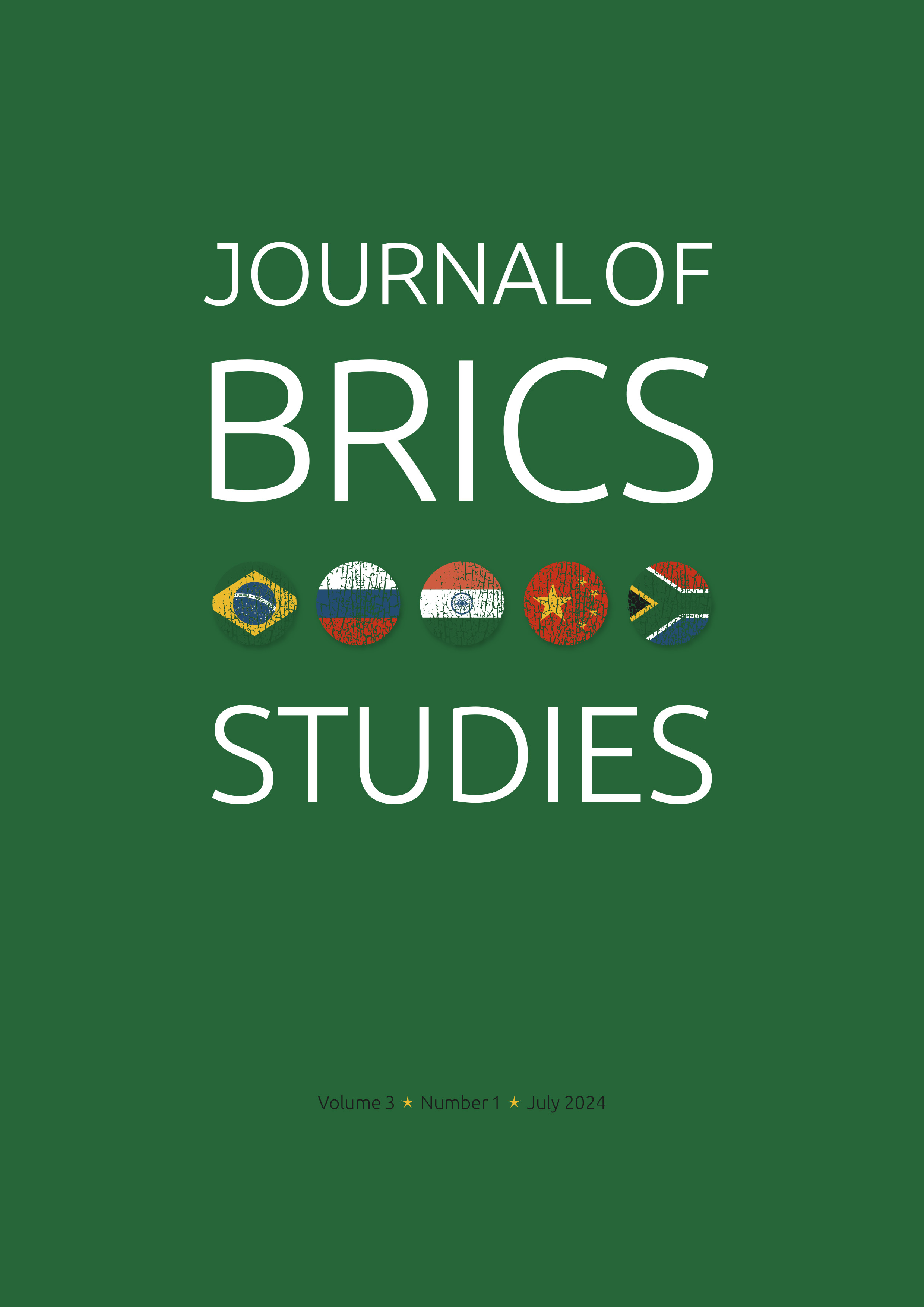The Role of the United States in the Formation of BRICS Exploring Responsibility and Influence
Main Article Content
Keywords
Brazil, United States, BRICS, Europe, Economic Dominance
Abstract
This article critically examines the formation of the BRICS alliance, comprising Brazil, Russia, India, China, and South Africa, with a specific focus on the pivotal role played by the United States in shaping this strategic partnership. It explores the extent of US influence and the accompanying responsibilities it assumes within the alliance. The article highlights the proactive efforts of Brazil, Russia, and China to expand their global influence while concurrently aiming to reduce US interference. Brazil, in particular, seeks partnerships with Russia and China as a means to attain autonomy and foster development. Simultaneously, Russia and China strive to challenge US global dominance and solidify their own spheres of influence. The article concludes by emphasising the importance of critically evaluating Europe's military support to Ukraine, suggesting that such support may primarily serve US interests. Additionally, it underscores Europe's potential to promote peace and stability by pursuing independent and principled foreign policies.
Article Metrics Graph
References
Andersen, M. E. (2018). Operation Condor: The United States and the Argentinian Dictatorship. Routledge.
BBC News. (2013, September 24). Brazil’s president Rousseff attacks US over spy claims. BBC News. Retrieved from https://www.bbc.com/news/world-latin-america-24230069
BBC News. (2014, July 10). Germany expels US spy chief in CIA row. Retrieved from https://www.bbc.com/news/world-europe-28243933
Bloomberg. (2023, April 24). BRICS Draws Membership Requests from 19 Nations Before Summit. Retrieved from https://www.bloomberg.com/news/articles/2023-04-24/brics-draws-membership-requests-from-19-nations-before-summit
BRICS. (2009). Yekaterinburg Declaration. Retrieved from https://brics2021.gov.in/BRICSDocuments/2009/Yekaterinburg-Declaration-2009.pdf
Breslin, S. (2018). China and the Global South: A Delicate Balancing Act. Global Policy, 9(3), 316-327.
Brown University Library. (n.d.). The U.S. Government and the 1964 Coup. In We Cannot Remain Silent. Retrieved from https://library.brown.edu/create/wecannotremainsilent/chapters/chapter-1-revolution-and-counterrevolution-in-brazil/the-u-s-government-and-the-1964-coup/
Câmara, O., de Castro, L., & Oliveira, S. (2022). How Different is the Brazilian Political System? A Comparative Study. In: Anais do Simpósio Interdisciplinar sobre o Sistema Político Brasileiro e XI Jornada de Pesquisa e Extensão da Câmara dos Deputados, (pp. 555-560). Brasília: Editora da Câmara dos Deputados. https://doi.org/10.46550/978-65-89700-34-0.555-560
Chomsky, N. (2013). Failed States: The Abuse of Power and the Assault on Democracy. Holt Paperbacks
China Daily. (2021, August 4). The Policy of Disengagement: An Evaluation of U.S.-China Relations. China Daily. Retrieved from http://www.chinadaily.com.cn/a/202108/04/WS6109d69fa310efa1bd6666bb.html
CNBC. (2022, September 12). BRICS: How a Goldman Sachs Acronym Became a Strategic Economic Bloc. Retrieved from https://www.cnbc.com/video/2022/09/12/brics-how-a-goldman-sachs-acronym-became-a-strategic-economic-bloc.html
CNN. (2018, March 20). Iraq War Fast Facts. Retrieved from https://www.cnn.com/2013/10/08/world/meast/iraq-war-fast-facts/index.html
Cucolo, E., & Cagliari, A. (2020, Novembro). Com Biden, Brasil precisa ser pragmático nas relações comerciais, segundo analistas. Folha de S.Paulo, Mercado. Recuperado de https://www1.folha.uol.com.br/mercado/2020/11/com-biden-brasil-precisa-ser-pragmatico-nas-relacoes-comerciam-segundo-analistas.shtml
DW News. (2021, May 25). Putin urges BRICS nations to cooperate with Russia. Retrieved from https://www.dw.com/en/putin-urges-brics-nations-to-cooperate-with-russia/a-62236984
Foreign Policy. (2023, April 24). BRICS Currency Could End Dollar Dominance. Retrieved from https://foreignpolicy.com/2023/04/24/brics-currency-end-dollar-dominance-united-states-russia-china/
Furtado, C. (1959). The economic growth of Brazil: A survey from colonial to modern times. University of California Press.
Giddens, A. (2019). Sociology. Polity Press.
Hacker, J. S., & Pierson, P. (2010). Winner-take-all politics: Public policy, political organization, and the precipitous rise of top incomes in the United States. Politics & Society, 38(2), 152-204. https://doi.org/10.1177/0032329210365042
Kornbluh, P. (2003). The Pinochet File: A Declassified Dossier on Atrocity and Accountability. The New Press.
Martins, P. N. (2018). BRICS and the challenge of global governance: Defining a strategic agenda. Routledge.
Michael Dunford (2023) Causes of the Crisis in Ukraine, International Critical Thought, 13:1, 89-125, https://doi.org/10.1080/21598282.2022.2163417
Pew Research Center. (2003). Anti-Americanism: Causes and Characteristics. Retrieved from https://www.pewresearch.org/politics/2003/12/10/anti-americanism-causes-and-characteristics/
Santos, B. de S. (2020). Epistemologies of the South: Justice against epistemicide. Routledge.
Sexton, J. (2012). The Monroe Doctrine: Empire and Nation in Nineteenth-Century America. Hill and Wang.
Talbot, D. (2015). The Devil’s Chessboard: Allen Dulles, the CIA, and the Rise of America’s Secret Government. Harper Perennial.
The Guardian. (2003, February 28). War jitters send oil prices to 28-month high. Retrieved from https://www.theguardian.com/business/2003/feb/28/oilandpetrol.news
The World Bank. (2017). BRICS and Development Alternatives: Innovation Systems and Policies. Washington, DC: World Bank.
United Nations. (2003, March 26). Security Council holds first debate on Iraq since start of military action; speakers call for halt to aggression, immediate withdrawal (Press Release No. SC/7705). Retrieved from https://press.un.org/en/2003/sc7705.doc.htm
World Bank. (2021). Global Economic Prospects, January 2021: From Containment to Recovery. Washington, DC: World Bank.
Zeng, K. (2023, February 17). Gauging the Impact of the China-U.S. Trade War. The Diplomat. Retrieved from https://thediplomat.com/2023/02/gauging-the-impact-of-the-china-us-trade-war/


